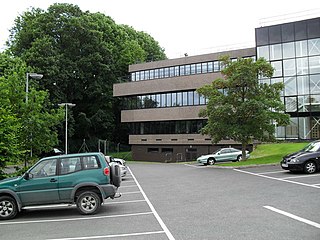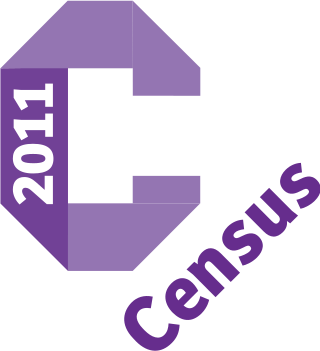
The Home Office (HO), also known as the Home Department, is a ministerial department of the Government of the United Kingdom. It is responsible for immigration, security, and law and order. As such, it is responsible for policing in England and Wales, fire and rescue services in England, Border Force, visas and immigration, and the Security Service (MI5). It is also in charge of government policy on security-related issues such as drugs, counterterrorism, and immigration. It was formerly responsible for His Majesty's Prison Service and the National Probation Service, but these have been transferred to the Ministry of Justice.

The Northern Ireland Assembly, often referred to by the metonym Stormont, is the devolved legislature of Northern Ireland. It has power to legislate in a wide range of areas that are not explicitly reserved to the Parliament of the United Kingdom, and to appoint the Northern Ireland Executive. It sits at Parliament Buildings at Stormont in Belfast.
The Northern Ireland Executive is the devolved government of Northern Ireland, an administrative branch of the legislature – the Northern Ireland Assembly. It is answerable to the assembly and was initially established according to the terms of the Northern Ireland Act 1998, which followed the Good Friday Agreement. The executive is referred to in the legislation as the Executive Committee of the assembly and is an example of consociationalist ("power-sharing") government.
Local government in Northern Ireland is divided among 11 districts. Councils in Northern Ireland do not carry out the same range of functions as those in the rest of the United Kingdom; for example they have no responsibility for education, road-building or housing. Their functions include planning, waste and recycling services, leisure and community services, building control and local economic and cultural development. The collection of rates is handled centrally by the Land and Property Services agency of the Northern Ireland Executive.
There are effectively two separate mainline railway systems in the United Kingdom – the Great Britain system and the Northern Ireland system, which are regulated and operated separately, and are constituted under separate pieces of United Kingdom legislation.

Northern Ireland Water Limited is the main water company in Northern Ireland.

The Department for the Economy is a devolved Northern Ireland government department in the Northern Ireland Executive. The minister with overall responsibility for the department is the Minister for the Economy.
The Department of Agriculture, Environment and Rural Affairs (DAERA) is a government department in the Northern Ireland Executive, the devolved administration for Northern Ireland. The minister with overall responsibility for the department is the Minister of Agriculture, Environment and Rural Affairs. The department was called the Department of Agriculture and Rural Development between 1999 and 2016. The Minister of Agriculture previously existed in the Government of Northern Ireland (1921–1972), where the department was known as the Department of Agriculture for Northern Ireland or the Ministry of Agriculture. The current Permanent Secretary is Denis McMahon.

The Department of Culture, Arts and Leisure was a devolved government department in the Northern Ireland Executive. The minister with overall responsibility for the department was the Minister of Culture, Arts and Leisure.
The Department for Communities is a devolved Northern Ireland government department in the Northern Ireland Executive. The minister with overall responsibility for the department is the Minister for Communities. The department was previously created in May 2016 following the Fresh Start Agreement and the dissolution of several departments, such as the Department for Social Development, the Department of the Environment, the Department of Culture, Arts and Leisure and the Department for Employment and Learning from which several functions have amalgamated.

The Northern Ireland Civil Service is the permanent bureaucracy of employees that supports the Northern Ireland Executive, the devolved government of Northern Ireland.

The Northern Ireland Prison Service is the agency charged with managing prisons in Northern Ireland.

The First Minister and deputy First Minister of Northern Ireland are the joint heads of government of Northern Ireland, leading the Northern Ireland Executive and with overall responsibility for the running of the Executive Office. Despite the titles of the two offices, the two positions have the same governmental power, resulting in a duumvirate; the deputy First Minister, customarily spelled with a lowercase d, is not subordinate to the First Minister. Created under the terms of the 1998 Good Friday Agreement, both were initially nominated and appointed by members of the Northern Ireland Assembly on a joint ticket by a cross-community vote, under consociational principles. That process was changed following the 2006 St Andrews Agreement, such that the First Minister now is nominated by the largest party overall, and the deputy First Minister is nominated by the largest party from the next largest community block.

The Northern Ireland Bureau The Northern Ireland Bureau is a diplomatic mission of the Northern Ireland Executive. It works to promote economic prosperity, cultural development and international growth and engagement between Northern Ireland and foreign countries.

The Department of Justice is a government department in the Northern Ireland Executive, which was established on 12 April 2010 as part of the devolution of justice matters to the Northern Ireland Assembly. The department's Permanent Secretary is Richard Pengelly. It combines the previous work of the Northern Ireland Office and the Ministry of Justice, within the United Kingdom Government, which were respectively responsible for justice policy and the administration of courts in Northern Ireland.

A census of the population of the United Kingdom is taken every ten years. The 2011 census was held in all counties of the UK on 27 March 2011. It was the first UK census which could be completed online via the Internet. The Office for National Statistics (ONS) is responsible for the census in England and Wales, the General Register Office for Scotland (GROS) is responsible for the census in Scotland, and the Northern Ireland Statistics and Research Agency (NISRA) is responsible for the census in Northern Ireland.

The Protocol on Ireland/Northern Ireland, commonly abbreviated to the Northern Ireland Protocol, is a protocol to the Brexit withdrawal agreement that sets out Northern Ireland’s post-Brexit relationship with both the EU and Great Britain. The Withdrawal Agreement, including the Protocol, came into effect on 1 January 2021. Citing the island of Ireland's "unique circumstances," the Protocol governs unique arrangements on the island between the United Kingdom and the European Union; it regulates some aspects of trade in goods between Northern Ireland and the rest of the United Kingdom.

The COVID-19 pandemic reached Northern Ireland in February 2020. At the start of the first official lockdown, the Department of Health reported 3,445 deaths overall among people who had recently tested positive. The Northern Ireland Statistics and Research Agency reported 5,680 where the death certificate mentioned COVID as one possible cause. Northern Ireland has the lowest COVID death rate per population in the United Kingdom. The vast majority of deaths were among those over the age of 60 and almost half were in care homes. According to figures, about 1 in 10 of over 5,600 who died from the acute infection were under 65.
The following is a timeline of the COVID-19 pandemic in Northern Ireland during 2020. There are significant differences in the legislation and the reporting between the countries of the UK: England, Scotland, Northern Ireland, and Wales.
The following is a timeline of the COVID-19 pandemic in Northern Ireland during 2021. There are significant differences in the legislation and the reporting between the countries of the UK: England, Scotland, Northern Ireland, and Wales.


































